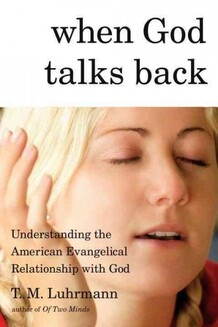When God Talks Back
Paul Harvey
Monday's Fresh Air aired an intriguing interview with anthropologist and psychologist T. M. Luhrmann, author of the new book When God Talks Back: Understanding the American Evangelical Relationship with God, a work based on participant-observation at Vineyard Fellowship churches over a number of years. Here's a little excerpt from the review:
Luhrmann says she noticed that when people in The Vineyard prayer group concentrated on speaking to God, they attended more intensely to their own internal worlds.
Monday's Fresh Air aired an intriguing interview with anthropologist and psychologist T. M. Luhrmann, author of the new book When God Talks Back: Understanding the American Evangelical Relationship with God, a work based on participant-observation at Vineyard Fellowship churches over a number of years. Here's a little excerpt from the review:
Luhrmann says she noticed that when people in The Vineyard prayer group concentrated on speaking to God, they attended more intensely to their own internal worlds.
"It becomes more alive, it feels more real, and occasionally it almost slipped over the edge of that boundary that separates the inner and outer, and they would hear God speak audibly or they would see something that somebody else wouldn't see," she says. "I don't think that has anything to do with ontology. If there is a God, God is choosing those moments when you have that unusual experience. But the psychological technique of prayer is independent of religion. It is a way of changing the inner experience of the person
At the New Yorker, Joan Acocella gives a New Yorker kind of review -- intelligent, skeptical, sometimes ondescending, but at the end appreciative -- here. One very appreciative review is here; there's a more skeptical review here. All have insightful points to make.
There's a fair amount here of religion-as-therapy, and if it works, why not see it as good. That's fine, but to me, the most interesting, and poignant, part of the interview came with the author's discussion of the relationship between the connection between prayer and the world of the imagination. Tanya Luhrman expresses some of these points as well here. A little excerpt:
What I found so striking as an anthropologist is that prayer changed people, not so much morally or emotionally, although prayer might change people in these ways, but in their capacity to imagine. Prayer changed the way people used their imagination and it changed the quality of their imagination, so that what they imagined felt more real to them. They became able to feel God beside then as they walked. They experienced God as talking back. They needed to use a new "theory of mind" to do this -- they needed to be taught that what happened in their imaginations could be real. But when they practiced taking what they imagined seriously, they began to feel that they had evidence that God was real and responding to them.
It is important to recognize the trained imagination at work in evangelical prayer because otherwise this style of faith can seem incomprehensible, even foolish, to onlookers. It is neither. These evangelicals are using a style of faith practice used by the desert fathers and medieval monks and -- in different forms -- by different faith communities around the world. They use these practices because these practices make God more real. In a world full of secular skepticism, that can be useful.
At the New Yorker, Joan Acocella gives a New Yorker kind of review -- intelligent, skeptical, sometimes ondescending, but at the end appreciative -- here. One very appreciative review is here; there's a more skeptical review here. All have insightful points to make.
There's a fair amount here of religion-as-therapy, and if it works, why not see it as good. That's fine, but to me, the most interesting, and poignant, part of the interview came with the author's discussion of the relationship between the connection between prayer and the world of the imagination. Tanya Luhrman expresses some of these points as well here. A little excerpt:
What I found so striking as an anthropologist is that prayer changed people, not so much morally or emotionally, although prayer might change people in these ways, but in their capacity to imagine. Prayer changed the way people used their imagination and it changed the quality of their imagination, so that what they imagined felt more real to them. They became able to feel God beside then as they walked. They experienced God as talking back. They needed to use a new "theory of mind" to do this -- they needed to be taught that what happened in their imaginations could be real. But when they practiced taking what they imagined seriously, they began to feel that they had evidence that God was real and responding to them.
It is important to recognize the trained imagination at work in evangelical prayer because otherwise this style of faith can seem incomprehensible, even foolish, to onlookers. It is neither. These evangelicals are using a style of faith practice used by the desert fathers and medieval monks and -- in different forms -- by different faith communities around the world. They use these practices because these practices make God more real. In a world full of secular skepticism, that can be useful.


Comments
I thought Malley made some interesting insights, but I didn't feel qualified to judge his methodology. Has anyone else had reactions to Malley's book?